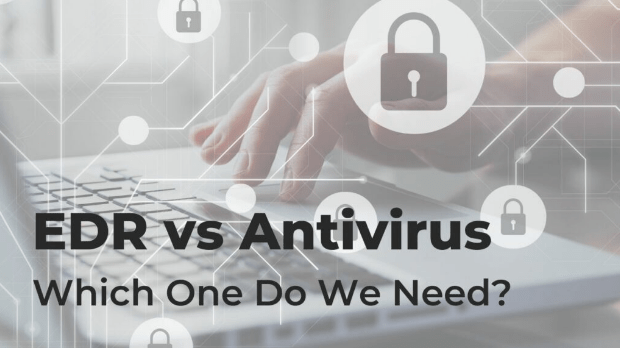More than 212,485 cybercrimes were reported worldwide in the first two months of 2022, and this number has increased since then.
Security analysts remain concerned about their organization's security posture, given the increasing rate of cyber crimes. They always hunt for the best solutions. The two most popular options available in the market are Antimalware programs and Endpoint detection and response. Since every cyber security head has limited resources, he can't invest money in all solutions, so he always asks, "Do I need Both EDR and Antivirus?".
If you are wondering about the same thing, it's time to get a detailed answer.

How Does Antivirus Secure Your System?
Once an antivirus program is installed on your computer, it will protect your system from malicious attacks. This software uses signature-based detection to identify, quarantine, and delete malicious code. It won't let malware cause any damage to your computer device.
An antivirus program has a database of known malware's signatures and codes. It scans all the files and systems as they enter your business system. It compares new codes with the existing ones, and when it finds a code similar to existing malware, it keeps the file separate. It's how your business system and files get protected from malicious attacks.
Installing an antivirus can keep your organization's system and network secure from malware attacks.
According to DataProt, every day, 560,000 new malware are detected.
When you install an antivirus program, it will help you deal with malware effectively.
How Does EDR Protect your Business?
EDR Stands for Endpoint Detection and Response system. You install an EDR agent on your endpoints, and it helps you analyze events from desktops, laptops, mobile devices, workstations, PCs, servers, and IoT devices.
The analysis aims to detect unusual behavior and activity on endpoints. If it finds anything suspicious, it readily alerts security experts. Besides, an EDR tool also initiates an automatic response. It contains potential threats and isolates affected endpoints from rest.
The best part about this endpoint detection is that it helps your cyber security team pinpoint potential threats before they may cause any damage. The continuous monitoring of your system ensures that threat actors won't get access to sensitive data on your system.
Traditional antvirus Vs. EDR
Traditional antivirus software might not be able to detect threats and attacks without signatures, but EDR can. Since EDR solutions don't only rely on signature-based detection modules, they are more effective than antivirus solutions at identifying both known and unknown threats, malware, and viruses. Endpoint detection and response tools offer user, process, application, file, network, and device activity visibility.
EDR solutions can protect against unknown malware threats, but antivirus software solutions are often simpler to use and, in some situations, can have a reduced impact on system resources. Some businesses utilize both antivirus software and EDR. However, contemporary EDR solutions are created to use in place of Antivirus software. A business using both EDR and Antivirus software simultaneously can cause questions about the efficiency and reliability of results.
Compared to an antivirus program, EDR provides far more detailed information to better incident response. Security analysts can investigate the malware's origin and ascertain the whole context and breadth of an attack using EDRs, which offer full attack visibility and context and history for each alert.
EDRs combine with various security tools to enhance security profiles even further. When a malware, malicious behavior, or future attacks are detected, EDRs generate alerts for inspection, investigation, and responses.
Do I Need Both EDR and Antivirus?
You don't need both EDR and Antivirus to secure your business system against cyber threats. When you run both systems on your business network, they will slow down the system and may cause technical issues across endpoints.
When you need to choose between EDR and Antivirus, you should go with EDR. The reason is that the EDR tool is an advanced security software. It can defend your business system against complex and evolving threats.
Antivirus reacts when there is a malware attack on your system, and you need more than a reactive defense approach.
According to Cybersecurity Ventures, the cost of global cybercrime will be USD 8 trillion in 2023.
The major problem with Antivirus is that it is only effective in dealing with known threats. It doesn't work when unknown viruses or malware attack your system.
If an unknown and brand-new ransomware attack happens on your system, your Antivirus won't detect it. As a result, you'll have to pay the cost of this cybercrime.
On the flip side, when you have a reliable EDR such as Xcitium EDR, it will monitor all your endpoints. It will help you create a robust security layer around your business.
EDR is effective in dealing with both known and unknown malware threats. It relies on signature-based detection to match the code of existing malware. But it's not the only technology you get inside EDR. It also has machine learning, behavior analytics, and artificial intelligence-based technology.
These technologies let your security analysts quickly detect and eradicate known and unknown threats.
Wrap up
So, when a business owner asks, "Do I need both EDR or Antivirus" to secure an enterprise network, the answer is ", No, you don't need both." Alone, EDR is good enough. It offers more comprehensive security than Antivirus.
